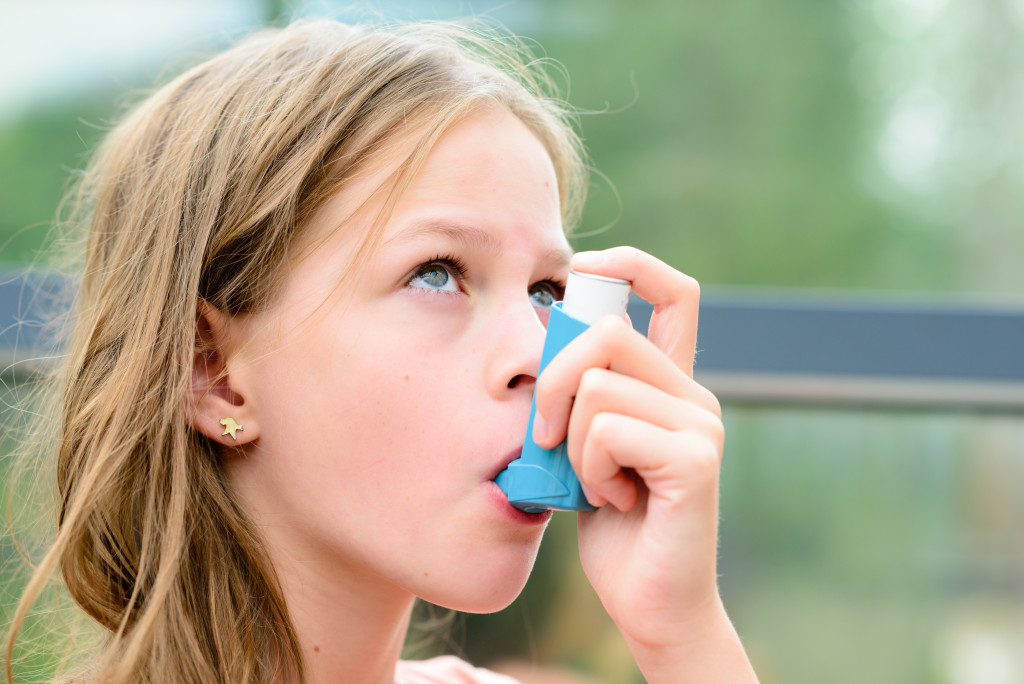Stay calm, and following the steps below are essential if your child has an asthma attack. Following these steps can help your child feel better and prevent their asthma from worsening.
Remain calm.
The best thing to do when your child has an asthma attack is to remain calm. Even if the situation looks dire, panic or overly anxious behavior will only worsen their experience. Instead, take a few deep breaths and gently speak in a soothing voice to keep you and your child from getting overwhelmed.
It will be helpful to have your first-aid kit close by as you remove any triggers of the attack (dust, smoke, etc.), take their medication if they need it, and monitor their symptoms until they are relaxed again. Staying calm during this challenging time can help everyone involved get through it without too much stress or fear.
Give them an inhaler.
When a child is having an asthma attack, it is essential to keep calm to help them get through it. If the child’s inhaler is available, they can use it to lessen the symptoms of their attack and reduce their discomfort. To use it properly, instruct your child to take slow, deep breaths as they hold down the inhaler and release any medication they can find inside.
Make sure to monitor your child for proper usage and potential side effects after using the inhaler. It’s important not to forget that if these methods do not work or the condition worsens, you should consult a doctor immediately for further assistance.
Have them sit up straight and lean forward slightly.
If your child has an asthma attack, it can be a frightening and stressful experience for both of you. However, it is essential to remain calm to provide the best care. Seating them up straight and leaning forward slightly can open up their airways so that they are better able to take in oxygen.
You can also have your child warmly breathe in through their nose and out through their mouth, which will help them relax and allow easier breathing. In addition, seek medical advice from an expert as soon as possible; understand any medication they are prescribing and how they should administer the treatment at home. You can support your child’s respiratory health with proper guidance and following prescribed care.
Call 911 if the attack is severe.

An asthma attack can be an incredibly stressful experience, especially when involving a child. It is essential to recognize the signs of an asthma attack – such as increased difficulty in breathing or dry coughing – and to act quickly with interventions like using the inhaler, checking their peak flow levels, and monitoring for blue lips or fingernails.
If your child’s asthma attack does not improve after taking their reliever inhaler or is severe, it is best not to take any chances: call 911 and seek medical attention immediately. It can be challenging to remain calm in times of distress, but it is vital that you stay composed and attentive when helping your child cope with an asthma attack.
You may also take them to a pediatric urgent care facility for medical attention if this is a faster solution. Make sure you have all of their medical information, including the type of inhaler and peak flow meter they are using. You’ll need this when you get to the doctor or urgent care center. Taking your child to the hospital might be a last resort if their condition is not improving after taking their medications and breathing exercises.
Stay with your child until help arrives.
When your child is having an asthma attack, it is important to stay with them until help arrives. Even if it feels like they are getting worse quickly, do not attempt to drive them to the hospital yourself; every minute counts in this situation and you will be best served by calling 911 or using another emergency transport service.
Make sure that your child is in a comfortable position; keep them sitting up so they can breathe better, but also make sure that their head is supported so they are not reclining too far back. Always have the necessary rescue medications available for an attack and be prepared to provide necessary information about your child’s condition when prompted by the medical team.
Knowing how to respond calmly and effectively will ensure that your child is treated as quickly as possible, reducing the severity of symptoms whenever possible.
If you have a child with asthma, it is important to be prepared in case they have an attack. By following these steps, you can help reduce the severity of an asthma attack and keep your child safe until professional medical help arrives.

